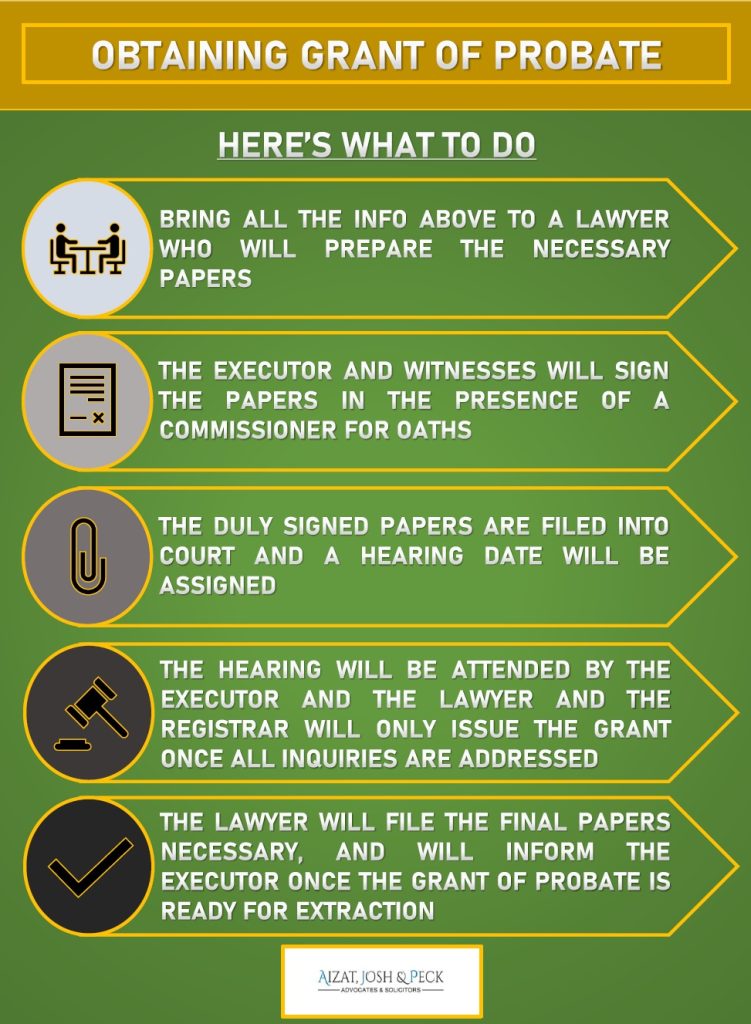By Joshua Jason Ng
The following are some practical tips and information that will help you to understand the procedure for the application for a Grant of Probate in Malaysia a little bit better.
A BRIEF OVERVIEW
WHAT?
The Grant of Probate is a grant under the seal issued by the High Court to the named Executor(s) in a Will.
WHY?
The grant is required before the Executor is allowed to administer the estate of the deceased.
WHO?
The Grant is applied for by the Executor(s) that is named in the Will.
WHEN?
The Grant should be applied for within six (6) years of the date of the deceased’s death.
HOW?
The Executor(s), via a lawyer will make an application to the Court for the Grant of Probate.
PRACTICAL TIPS ON THE APPLICATION FOR GRANT OF PROBATE
THE FIRST STEPS
Picture this, you have recently found out that you were named as an Executor of the Last Will and Testament of a recently deceased loved one. What do you do now? Do you immediately go to the banks to withdraw all the monies left behind? What about the house and the car that is just sitting in the porch?
Before you do anything, the first step in to make sure you have the original copy of the Deceased’s will and an Original Death Certificate.
(Practical Tip : A copy of the will might not always be found in the Deceased’s home. Try checking with their former solicitor, safe deposit box and/or Professional Will Writers to find out if a copy of the Will is stored with them)
THE PROCEDURE
You will then need to consult a lawyer on the upcoming procedure. From these documents, namely the Will, you will be able to garner the pertinent details required for the next step; The details of the Executor to the will and the two witnesses. The Will should also lay out the details of how the deceased’s assets are to be distributed.
Once the will has been studied, the lawyer can then proceed to prepare the papers necessary for the application of the Grant of Probate. The papers that will be filed into court are
1. A Notice of Appointment, confirming the lawyer’s appointment by the Executor;
2. An Originating Summons, which will list down the particulars of the application;
3. A Supporting Affidavit affirmed by the Executor, verifying the contents of the application;
4. An Administration Oath affirmed by the Executor that states among other things that he will administer the Deceased’s estate properly and in good faith; and
5. An Affidavit affirmed by each of the Witnesses respectively confirming that they were indeed present during the original signing of the Will by the deceased.
Once these papers are filed, the Court will give out a date for the hearing of the application. On the date, the executor, along with the lawyer will be in attendance at the court of relevant jurisdiction, before the Registrar. Provided that all the papers are in order, the Registrar will the grant an Order in Terms, and the lawyer will now be required to file the confirmation, along with the list of assets and liabilities as well as the list of beneficiaries to the will.
(Practical Tip : The Courts will require the Original Copy of the Will to be handed over to them during the hearing for their records. So always make sure you have additional copies on hand for future reference.)
OBTAINING THE GRANT
Once that is done, the court will produce the Grant of Probate, which will be extracted by the Lawyer and passed to the Executor, who will then be allowed to carry on with his duties i.e, liaising with the banks, land office etc.
(Practical Tip : The Grant of Probate is now produced digitally, meaning that there is no original physical copy so to speak. Should your banks or any other institution require it, you may request that your lawyer obtain Certified True Copies of the Grant from the Courts itself.)
Feel free to save the following infographic for your ease of future reference :


Disclaimer : The information provided on this website does not, and is not intended to, constitute legal advice; instead, all information, content, and materials available on this site are for general informational purposes only. Information in this article is subject to change without any prior notice.
Readers of this website should contact their solicitor to obtain advice with respect to any particular legal matter. No reader, user, or browser of this site should act or refrain from acting on the basis of information on this site without first seeking legal advice from counsel in the relevant jurisdiction.



Leave a Reply